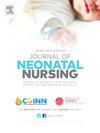Professional perceptions of barriers and facilitators from the implementation of a neonatal early supported transfer to home intervention for late preterm infants: A qualitative study
Q2 Nursing
引用次数: 0
Abstract
Introduction
Late preterm infants may have prolonged stay in hospital due to increased care needs and a lack of community support. A neonatal early supported transfer to home (NEST@Home) intervention was introduced. We explored professional perceptions of barriers and facilitators to implementation of NEST@Home.
Methods
Neonatal healthcare professionals in England participated in group interviews based on the Consolidated Framework for Implementation Research (CFIR). Data were analysed using thematic analysis.
Findings
Perceived barriers included lack of facilities, poor clinical buy-in, budget restraints, staff shortages, absence of policy, and a lack of commissioning support. Perceived facilitators to implementation included healthcare professional's positive attitudes, pre-discharge planning, parent education, parent training, and loan of monitoring equipment.
Conclusion
This study identified individual, interpersonal, and organisational features that may facilitate or impede the NEST@Home intervention. Further research is needed to identify how this intervention impacts outcomes, and to understand the experience of parents receiving NEST@Home.
对晚期早产儿实施新生儿早期支持转移到家庭干预的障碍和促进因素的专业认知:一项定性研究
由于护理需求增加和缺乏社区支持,晚期早产儿可能会延长住院时间。引入新生儿早期支持转回家(NEST@Home)干预。我们探讨了专业人士对实施NEST@Home.MethodsNeonatal的障碍和促进因素的看法,英国的医疗保健专业人员参加了基于实施研究综合框架(CFIR)的小组访谈。采用专题分析对数据进行分析。研究发现,人们认为的障碍包括缺乏设施、临床支持不足、预算限制、人员短缺、缺乏政策和缺乏调试支持。认为促进实施的因素包括医护人员的积极态度、出院前计划、家长教育、家长培训和监护设备的租借。结论:本研究确定了可能促进或阻碍NEST@Home干预的个人、人际和组织特征。需要进一步的研究来确定这种干预如何影响结果,并了解接受NEST@Home的父母的经历。
本文章由计算机程序翻译,如有差异,请以英文原文为准。
求助全文
约1分钟内获得全文
求助全文
来源期刊

Journal of Neonatal Nursing
Nursing-Pediatrics
CiteScore
2.00
自引率
0.00%
发文量
143
期刊介绍:
Aims & Scope: This is the practical, bimonthly, research-based journal for all professionals concerned with the care of neonates and their families, both in hospital and the community. It aims to support the development of the essential practice, management, education and health promotion skills required by these professionals. The JNN will provide a forum for the exchange of ideas and information between the range of professionals working in this field; promote cooperation between these professionals; facilitate partnership care with families; provide information and informed opinion; promote innovation and change in the care of neonates and their families; and provide an education resource for this important rapidly developing field.
 求助内容:
求助内容: 应助结果提醒方式:
应助结果提醒方式:


